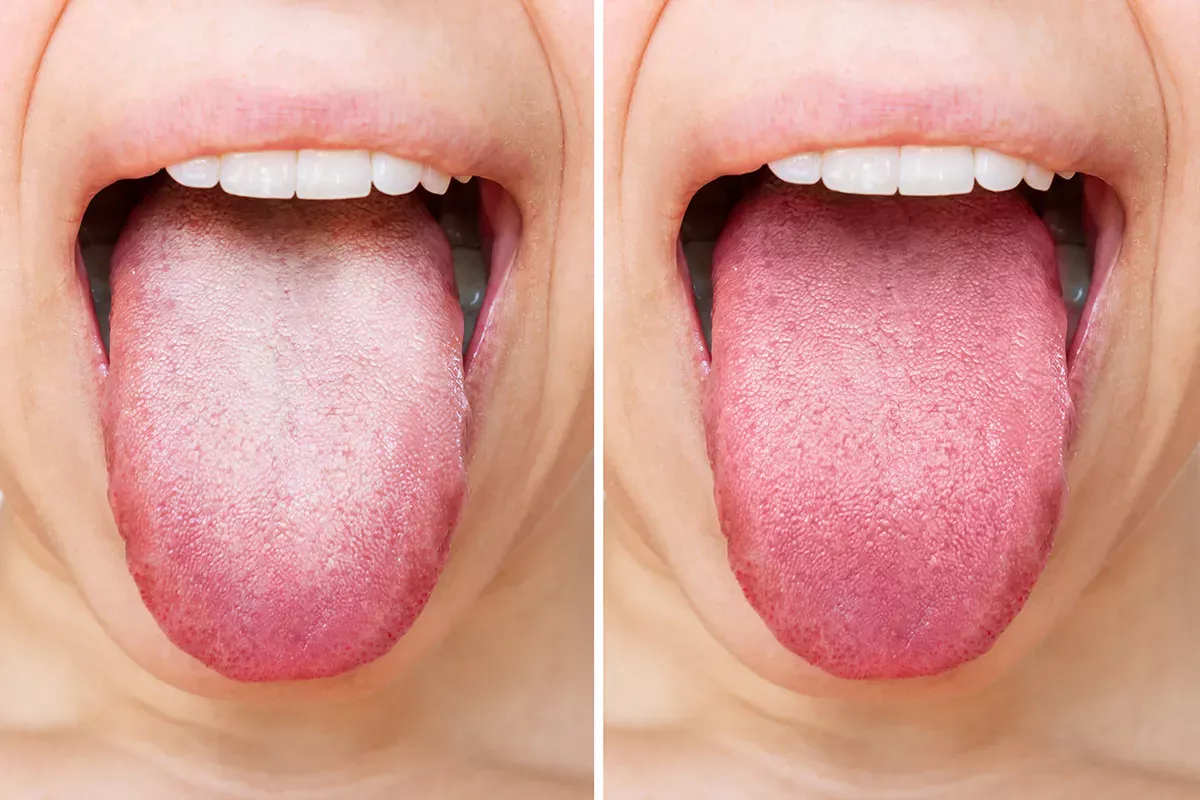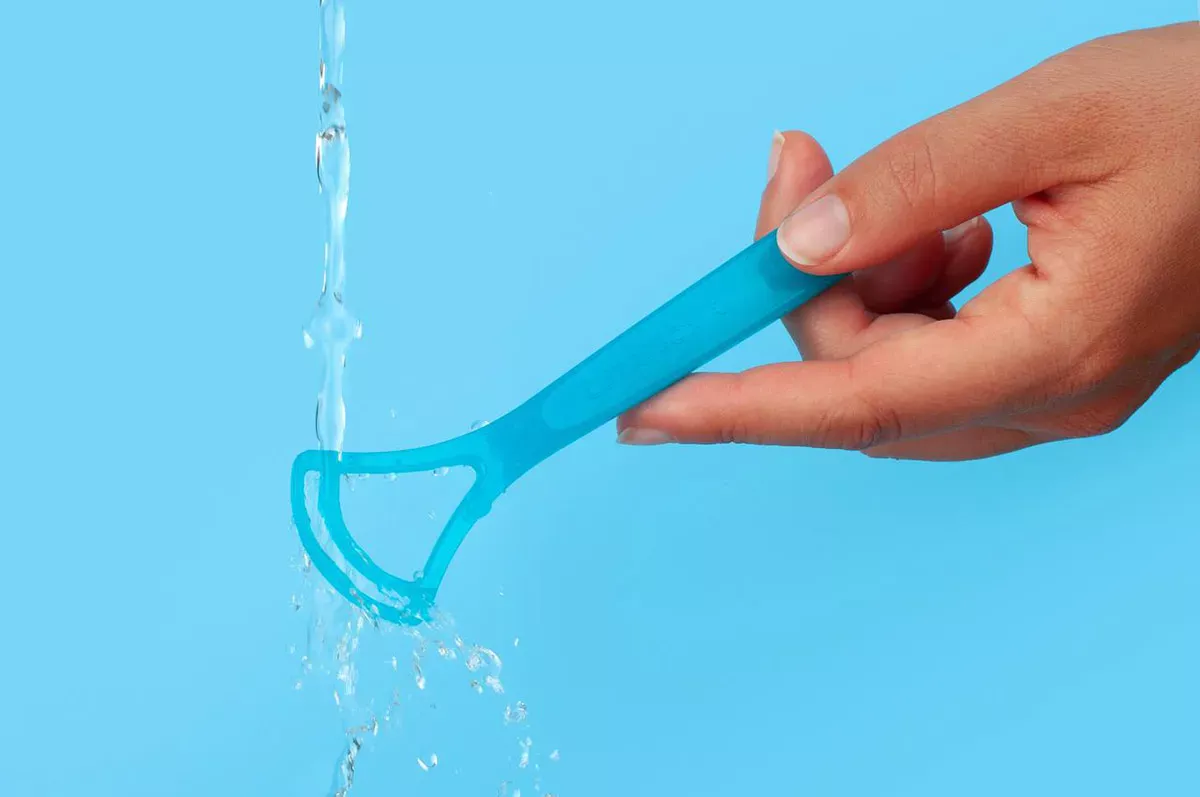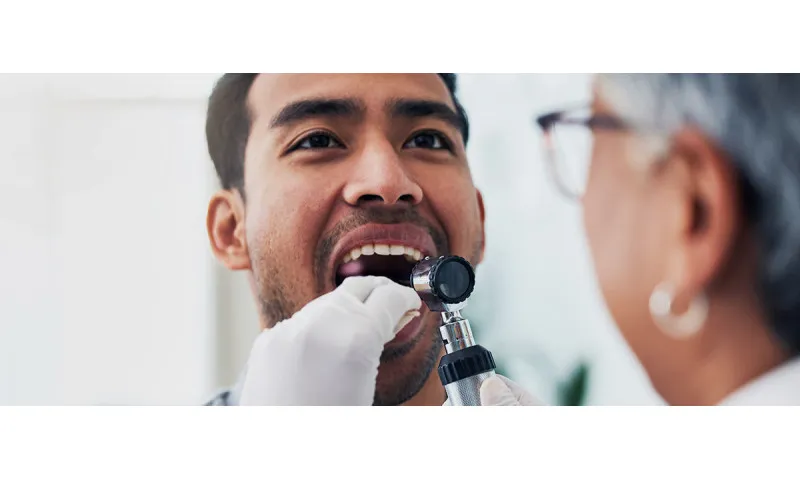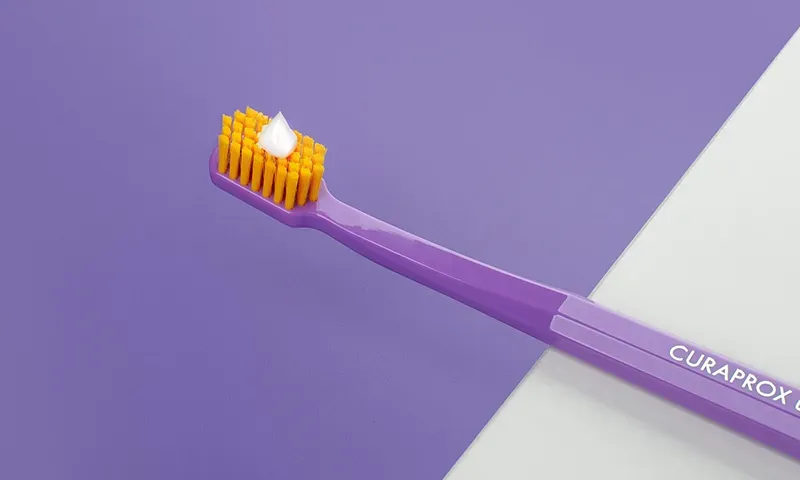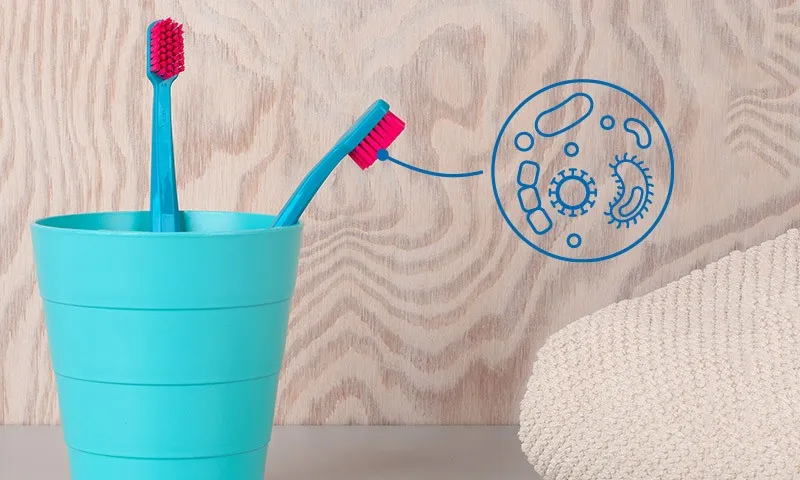What is a tongue scraper?
A tongue scraper is a special instrument for removing any coating from your tongue and usually has a flat, narrow and long shape to reflect the anatomy of the tongue. Made of copper, silver and various other metals, tongue cleaners have long been used by practitioners of Indian Ayurveda. In Europe, the majority of available models are plastic and often come with grooves, raised surfaces or a second scraping edge.
While metal tongue cleaners are definitely more sustainable, as you can sterilise them in boiling water and use them for years to come, plastic models are probably better in terms of their cleaning efficacy. This was the conclusion of a scientific study carried out by an Indian university (see sources).
Why is cleaning your tongue important?
While people in the western world diligently brush their teeth twice a day and are regularly advised by their dentist to clean the gaps between their teeth (by the way, this is done better with interdental brushes than with dental floss), most of them never give their tongue a second thought. Although there is a very good reason why cleaning your tongue should become part of your daily oral hygiene routine: Roughly 60 to 80 percent of the bacteria in your mouth is found on the tongue. So, does cleaning your tongue have a greater impact on your overall health than we in the west might think?
Bacteria love to nestle between the papillae on the rough surface of your tongue: Food debris, dead cells and other deposits are simply the perfect environment for bacteria. And when they start to produce unpleasant-smelling sulphur compounds, the result is bad breath.
Bacteria prefer to make themselves at home on the back part of your tongue. While the front part comes into contact with the roof of your mouth when speaking and swallowing and remains in motion, very little happens on the back part of your tongue. This obviously allows bacteria to multiply and spread – potentially promoting periodontitis and, in severe cases, resulting in tooth loss.
According to Ayurveda, the tongue also allows the body to get rid of metabolic wastes. When cleaning your tongue with a tongue scraper, you are supposedly removing waste products and assisting your body in eliminating toxins.
Are tongue scrapers worthwhile?
But what does science have to say on this matter? Are tongue scrapers good or bad? And what exactly does a tongue scraper have to offer? There is still no real agreement among researchers on this subject. A Belgian study examined patients with periodontitis – inflammation of the periodontium – and found that the numbers of bacteria did not decrease significantly after two weeks of tongue cleaning.
However, there are numerous studies – particularly in Asia – that prove tongue scraping does have a positive impact on a person's oral health. There is consensus among scientists on one issue though: Tongue scrapers do not damage your tongue.
Effective impact: Tongue scrapers against bad breath
According to estimates, bad breath can be attributed to issues within the oral cavity 85 percent of the time. And in 50 percent of these cases, bad breath is usually caused by a build-up of bacteria on the tongue. Can you simply remove this coating with a tongue scraper and say goodbye to bad breath forever? This was investigated in two studies by Korean and Indian scientists. The simple answer is: Yes. Both bad breath and a build-up of bacteria on the tongue were reduced significantly by regular tongue cleaning. In other words, tongue cleaners help to combat bad breath.
However, if your bad breath persists despite cleaning your tongue regularly, it may be prudent to go and have a check-up. Perhaps the reason for your bad breath originates in your nose cavities or digestive tract. All the same, remember to clean your interdental spaces once a day using an interdental brush. Since bacteria can also accumulate in the gaps between your teeth, leading to unpleasant-smelling sulphur compounds.
Good to know:
You can use Curaprox tongue scrapers to simply scrape away the bacteria that cause bad breath. Choose between four colours and two models: Featuring either one or two scraping edges. And enjoy fresher breath after the very first application.
Better oral hygiene thanks to tongue cleaning
Further, there are numerous studies that show that plaque formation slows down when using a tongue scraper regularly. Even in the studies that did not detect a reduction in bacteria levels, the participants stated that their tongues felt cleaner. Moreover, tongue scrapers remove residue from your taste buds. And this alone will probably boost your sense of taste, making the food you eat tastier. Below are pictures of a tongue before and after use of a tongue cleaner. The tongue on the right is clearly much cleaner.
In summary, tongue scrapers leave your mouth feeling cleaner overall and help prevent bad breath by getting rid of unpleasant-smelling sulphur compounds.
How to use tongue scrapers correctly
It therefore makes sense to incorporate tongue cleaning into your daily dental hygiene routine. But how do you use a tongue scraper correctly? And how often? Find the answers to all your questions about using tongue scrapers below.
How do you use a tongue scraper correctly?
Tongue scrapers are pretty easy to use:
- Open your mouth and stick out your tongue.
- Holding the handle of the tongue scraper, place it as far back on your tongue as possible.
- Apply a slight amount of pressure and pull the tongue scraper to the front of your tongue in one slow motion.
- Rinse the tongue scraper under running water to get rid of any scraped off coating.
- Repeat this process three to four times to remove all the coating from your tongue.
Scraping before or after brushing your teeth?
Using a tongue scraper to clean your tongue is the crowning glory of your morning routine and should be done after brushing your teeth. Ideally, you will still have some toothpaste in your mouth. If you do not use a tongue scraper straight after brushing your teeth, simply place a little toothpaste on it to fight bacteria particularly effectively.
Good to know:
Did you know that you should just spit out fluoride toothpaste after brushing your teeth and not rinse your mouth with water? This allows the fluoride to develop its full effect and provide reliable and lasting enamel protection.
How often should you use a tongue scraper?
Clean your tongue once a day – ideally in the morning – with a tongue scraper. In the evening, you can pay extra attention to your interdental spaces with the aid of an interdental brush.
Note: Do not clean your tongue excessively. If it starts to bleed, you have definitely applied too much pressure.
How often should you replace a tongue scraper?
How often you should replace your tongue scraper depends on the material it is made of. You can use metal tongue scrapers for years if you periodically disinfect them in boiling water. Plastic models should be replaced every three months – just like your toothbrush. It is probably best to change your toothbrush and tongue cleaner at the same time so as not to become confused.
How can you clean your tongue without having to gag?
Preferably use a tongue scraper that is as flat and as anatomically accurate as possible to avoid gagging when cleaning your tongue. The gag reflex is generally triggered when tongue cleaners or toothbrushes come into contact with the roof of the mouth.
A good approach is to start slowly and gently with the tongue scraper in the middle part of your tongue. Then gradually work your way to the very back of your tongue. This allows you to get used to the feeling of a tongue scraper without gagging.
Good to know:
The ergonomic Curaprox tongue scrapers are shaped according to the anatomy of the tongue and ensure maximum cleaning without causing any gagging or discomfort. It takes less than one minute to clean your tongue correctly and this technique can be easily incorporated into your morning routine.
How can a tongue scraper be cleaned?
Clean your tongue scraper as you would a toothbrush: Simply hold the tongue scraper under warm, running water, then let it air dry – preferably in a toothbrush mug.
Are there alternatives to tongue scrapers?
Does it necessarily have to be a tongue scraper or can you shake things up a little when it comes to cleaning your tongue if it feels particularly furry?
Cleaning your tongue with a toothbrush – is it possible?
Many people use a toothbrush to clean their tongue. But is that even possible and effective? This question was addressed by several groups of scientists in both Asia and Brazil, who wanted to know: What cleans the tongue better? Tongue scraper or toothbrush? The result: You can also clean your tongue with a toothbrush. In the tests carried out, toothbrushes provided similar or only slightly worse performance than tongue scrapers.
The fact is: An anatomically accurate tongue scraper allows you to clean your tongue faster than with a toothbrush and without any gagging or discomfort. Cleaning the back part of your tongue with a toothbrush can be particularly uncomfortable as it is simply not flat enough for the job – this also applies to toothbrushes with a tongue scraper integrated on the rear. However, you need to pay particular attention to the rear third of your tongue, since this is where the majority of bacteria tend to nestle.
Good to know:
If you use a toothbrush to clean your tongue, please do not use the same one to brush your teeth. As you would simply be spreading the harmful bacteria across your teeth, where they can wreak a lot more havoc. Probably the best idea is to have a separate toothbrush that is used exclusively for cleaning your tongue.
SOS equipment: Cleaning your tongue with a spoon
If you do not have a separate toothbrush or a tongue scraper to hand, but still want to get rid of the unwanted coating from your tongue, you can also use a spoon as a last resort to carefully remove it. However, always make sure that the spoon has rounded edges to avoid accidentally injuring yourself.
Homemade tongue scrapers
Some people decide to turn tongue cleaning into a craft project and actually make their own tongue cleaners out of copper wire. But this is not something we recommend. Homemade tongue scrapers are not only less effective, they can also be dangerous. You can very easily injure your tongue or oral mucosa with the sharp-edged wire. Instead, invest a little money and buy yourself a proper tongue scraper. For instance, the Curaprox tongue scraper set is available for a little under five pounds.
Home remedies for cleaning your tongue
When it comes to cleaning your tongue, there is no home remedy that matches the effectiveness and convenience of a tongue scraper. Nonetheless, we have a few tips on how to reduce the coating on your tongue through simple home remedies:
Eat hard and crunchy foods
A crunchy apple, a raw carrot and hard bread crusts – all these foods naturally scrape the coating off your tongue, leaving it feeling fresh and clean. People who only eat soft cooked products have significantly more coating on their tongues than those who incorporate raw food into their diet.
Drink lots of tea and water
Individuals who drink more experience less tongue coating and reduce their chance of developing dry mouth, effectively avoiding two primary causes of bad breath. So, make sure you drink at least two litres throughout the day – ideally water or unsweetened teas.
Talking of tea: Sage and black tea have a disinfecting effect and can help to clean your tongue. But beware! Do not overdo it with black tea if you like having white teeth. Alongside coffee and red wine, black tea is known to cause staining when consumed on a regular basis.
Chew gum
Saliva rinses and removes bacteria from your tongue. Therefore, you can also resort to home remedies that stimulate the flow of saliva to clean your tongue. Besides stimulating saliva production, sugar-free chewing gum with xylitol also helps protect your teeth against dental decay.
Pull oil
Oil pulling, just like tongue cleaning, has long been used by practitioners of Indian Ayurveda. Simply place a teaspoon of oil of your choice into your mouth and 'pull' it between your teeth for roughly 15 minutes. Lots of people use olive oil or coconut oil for pulling. The oil is said to bind and remove bacteria and toxins from your tongue and oral mucosa. These positive effects are based on anecdotal evidence and there is no scientific evidence to back up these claims.
FAQs – tongue cleaning
Before introducing tongue cleaning to your daily oral hygiene routine, you may have a few questions. We have answered some of the most frequently asked ones about tongue cleaning below:
Which type of tongue scraper is the best?
A good tongue scraper should be as flat and as anatomically accurate as possible to avoid gagging. For example, one study found that plastic tongue scrapers offered the greatest cleaning performance. Other studies claim that metal and plastic tongue scrapers have the same cleaning efficacy. Plastic tongue scrapers have the advantage of feeling more comfortable though.
Are tongue scrapers healthy?
Yes, tongue scrapers are healthy. They remove stubborn bacteria that feel right at home on the back of your tongue and that promote oral diseases such as periodontitis. Tongue scrapers are also a helpful and highly effective way to combat bad breath.
Do tongue scrapers damage your tongue?
No, when used properly, tongue scrapers are not harmful. Quite the contrary: By removing the coating from your tongue, you are in fact getting rid of some nasty bacteria and unpleasant-smelling sulphur compounds. This may also have other benefits, including improving your sense of taste. Nevertheless, always be gentle and do not apply too much force while scraping. Light pressure is enough to remove the coating from your tongue.
Are there tongue cleaners available for children?
We do not offer special tongue cleaners for children. However, you can use a flannel or a damp cloth to clean a baby's tongue. As soon as your child's mouth is large enough, they can start using a standard tongue scraper. Another solution is to use a second children's toothbrush.
Coated tongue despite tongue scraper – what should I do?
If the coating on your tongue fails to disappear despite cleaning it correctly, you should always consult a health care professional as it may be a sign of an underlying health condition. This is especially true if the coating on your tongue is not whitish but a different colour.
Is it worth having your tongue cleaned professionally?
In addition to professional dental cleaning, some dentists also offer a tongue cleaning service. This involves a dental hygienist applying a special cleaning gel and using a tongue sanitiser or an ultrasonic tongue cleaner to remove the bacterial coating. This deep cleaning method may be useful, for example, if you suffer from very bad breath. Usually, however, it is enough to simply clean your tongue with a tongue scraper at home. The costs for having your tongue cleaned professionally can vary from dentist to dentist.
My tongue bleeds after cleaning it – what should I do?
If your tongue bleeds after cleaning it, you have most probably applied too much pressure. In this case, use a clean damp cloth to apply pressure to your tongue until it stops bleeding. Always consult your dentist if you are unsure or if the injury appears to be more serious. Next time you clean your tongue, be more gentle and apply less pressure to prevent injury.
Are there electric tongue cleaners?
Yes, some electric toothbrush manufacturers also offer attachments that turn the toothbrush into an electric tongue cleaner. However, cleaning your tongue with a normal manual tongue scraper is perfectly adequate.
What are the disadvantages of metal tongue scrapers?
Most metal tongue scrapers have a smooth surface and therefore feel somewhat 'sharper' than their plastic counterparts. Further, silver, copper or stainless steel tongue cleaners are generally more expensive than plastic ones. Copper tongue scrapers also have the disadvantage of changing colour over time and of a thin layer of greenish-black material known as 'patina' forming on the surface. As a result, they need to be cleaned regularly in a mix of lemon and white vinegar. However, this is nothing to worry about as copper tongue scrapers are neither toxic nor unhealthy.
Where can I buy a tongue scraper?
Tongue scrapers are available from all good drugstores and pharmacies or can be purchased in our online shop. Curaprox offers single-bladed tongue scrapers and double-bladed tongue scrapers for particularly intensive cleaning. You can purchase both models in a handy tongue scraper set to find out which one suits you best.
Sources
Brauckhoff, Grischa et. al: Gesundheitsberichterstattung des Bundes. Heft 47: Mundgesundheit. Robert Koch-Institut. 2009.
Choi, Ha-Na et al.: The Effect of Mechanical Tongue Cleaning on Oral Malodor and Tongue Coating, in: International Journal of Environmental Research and Public Health. 2022.
Deutsche ApothekerZeitung: Übler Mundgeruch: Wenn man sein Gegenüber nicht riechen mag.
Dwivedi, Vartul et al.: Effectiveness of Various Tongue Cleaning Aids in the Reduction of Tongue Coating and Bacterial Load: A Comparative Clinical Study, in: The Journal of Contemporary Dental Practice. 2019.
Hasler, Debora: Täglich die Zunge reinigen, ist das sinnvoll?, at: zahnarztzentrum.ch.
Hellwege, Klaus-Dieter (Hrsg.): Die Praxis der zahnmedizinischen Prophylaxe. Ein Leitfaden für die Individualprophylaxe für Zahnärzte und Mitarbeiter, Thieme 2018.
Laleman, I. et al: Influence of tongue brushing and scraping on the oral microflora of periodontitis patients, in: Journal of Periodontal Research. 2017.
Pedrazzi, Vinicius et al.: Tongue-Cleaning Methods: A Comparative Clinical Trial Employing a Toothbrush and a Tongue Scraper, in: Journal of Periodontology. 2004.
Rauch, Jasmin: Zungenreinigung: Wie sinnvoll sind Zungenschaber?, at: gesundheit.de.
Stiftung Warentest: Helfer gegen Mundgeruch.
TS1 Zungensauger: TS1 – Anwendung.
Zm online: Zungenreinigung verringert nicht die Bakterienlast.
Zahnarztpraxis Münchenberg: Zunge: Wohlfühlort für zahlreiche Bakterien.
 Swiss premium oral care
Swiss premium oral care

